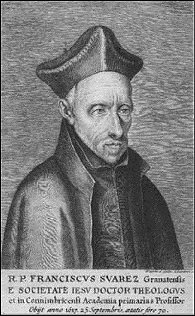


| GENERAL | SECTIONS | DETAILS | ORGANIZERS |
The Conference intends to present Suárez’s metaphysics from three different perspectives. These perspectives will be represented by the following three sections, of which each is supposed to have one key Speaker. The sections will not overlap, so that it will be possible to attend all of them.
It is a well-known fact that Suárez possessed enormously broad and deep knowledge of his philosophical and theological ancestors. His knowledge not only of scholastic authors like Avicenna, Averroes, Alexander of Hales, Albert the Great, Aquinas, Henry of Ghent, Giles of Rome, Scotus, Antonius Andreas, Hervaeus Natalis, P. Aureoli, Durandus, Capreolus, Gabriel Biel, Cajetan, Sylvester of Ferrara, Soncinus, Javellus or Domingo de Soto, but also of Aristotle, of St. Augustine, John Damascene and of his immediate precursors and contemporaries like Pedro Fonseca (1528–1599) or Suárez’s alter ego Gabriel Vázquez (1549–1604), is unique and admirable. It is just this extraordinarily broad scale of possible influence, that has been only partly explored, and, one has to admit, mainly in the Spanish¬ speaking countries, that calls for additional intensive research. Some slight improvement of the situation could be brought about by the contributions within this section.
Some significant work has recently been done on the analysis and interpretation of some systematically significant concepts and theories which play important roles within Suárez’s metaphysical system. It is enough to mention discussions regarding the ontological status of the objective concept, the role of the notion of the extrinsic denomination and the topic of individuality. However, many of those themes were approached without taking into account the broader context of the entire Metaphysical Disputations. Besides, we lack a thorough analysis of the problem of categories, of the problem of causality with respect to Suárez’s theory of modes, etc. Some of those „white spaces on the map of the Suarezian research“ might be filled up by the contributions given in this section.
Scholars have hitherto focused mainly on the question of Suárez’s impact on Descartes’ theory of the creation of the eternal truths and the possibles, and to a lesser extent also on his theory of distinctions and of objective being. Apparently, a smaller amount of work has been done e.g. on the impact of Suárez’s metaphysics on Spinoza’s theory of modes, Leibniz’s conception of metaphysics as scientia possibilium and Malebranche’s occasionalist doctrine. Concerning the influence of Suárez’s metaphysics on the subsequent early-modern scholastic philosophy (mainly the Jesuit stream), the situation is even worse. So far historical research has focused almost exclusively on the representatives of the main stream of early modern philosophy, i.e. early-modern rationalism, whereas the rich and manifold heritage of the scholastic philosophy in the 17th century remained, until recently, neglected. We lack any detailed description and analysis of the historical influence of Suárez’s metaphysics upon his immediate Jesuit successors like Hurtado de Mendoza (1578–1641) or Francisco Oviedo (1602–1651), not to speak of his impact on the members of the other two great schools of thought, thomism and scotism, or on various other independent scholastic thinkers. It is the intention of the Organizing Committee to contribute to improving this situation.